Deadly wait for climate fund
Nearly five months after the world’s longest-lasting cyclone affected more than 2.2 million people in Malawi’s Southern Region, Thokozani Lifa is still stuck in destitution.
She was among 563 771 people displaced by Cyclone Freddy in March.
According to the Department of Disaster Management Affairs, the torrential rains, gusty winds, landslides and flooding claimed over 1 000 lives, with some still missing.
Following the disaster, President Lazarus Chakwera appeared for international humanitarian support in aid of the affected population, including thousands sheltered in 577 evacuation camps in all the devastated districts.
However, the camps that welcomed humanitarian aid shortly after the disaster are now almost deserted, with desperate survivors resorting to piecework to earn a living.

“It feels like we are serving life imprisonment here,” says Lifa. “We don’t know what lies ahead.”
The teenage gave birth to her first child in March at a camp in Nsanje.
“Life is tough here as there is not enough food. At times, weeks pass without any food aid.”
Lifa often leaves the camp to look for piecework in the hope of earning some money for buying food and other basics.
Her voice strains and fades as she recounts the challenges faced by the survivors in their day-to-day search for piecework.
“You have to be extremely lucky to find piecework as the floods here destroyed almost everything. There is nothing much here,” says the teen mother.
Kuchene Women Forum provides humanitarian and protection support interventions in camps in the district at the southern tip of Malawi.
Its chairperson, Alice Kathumba, says the forum has registered over 100 cases that mirror a breakdown in social protection services.
“These include sexual exploitation and early marriages as coping mechanisms to the vagaries of life brought about by disaster,” she states.
Since Cyclone Idai struck in 2019, government has been promising to relocate survivors to highlands with social amenities, but no one has shifted to safety.
“Actually, the survivors of Cyclone Freddy fear that they will be in the camps till the next rainy season, which is just three months away,” says Kathumba.
The area was also hit hard by cyclones Ana and Gombe, whose loss and damage was estimated at K2 trillion by Dodma.
The frequent and intense climate-induced disasters keep hitting poor countries, including Malawi, amid wealthy nations’ reluctance to fulfil the $100 billion pledge to countries hardest hit by climate change.
The calls for the big emitters to fulfill the pledge has been bolstered by the Loss and Damage Fund formed at CoP27, the 27th United Nations Climate Change Conference in Egypt last year.
While the UN climate change treaty UNFCCC represents a landmark breakthrough in ensuring vulnerable countries are given reparations for adaptation and rebuilding, there have been concerns that the fund for loss and damage is unduly taking time to be activated. Its operationalisation framework will be finalised and approved in December when parties to the UN Climate Change treaty meet in Dubai, United Arab Emirates.
As frustration is building up, experts believe the climate disaster faced by developing countries like Malawi also worsens the debt crisis.
ActionAid Malawi executive director Pamela Kuwali says. “[Malawi] Government is borrowing to invest in the agriculture sector which is at the mercy of climatic shocks such as disasters and drought.
“No wonder, countries that are hardest hit by climate change are also the ones in debt crisis.”
Kuwali’s sentiments are backed by a recent ActionAid report, The Vicious Cycle: Connections Between the Debt Crisis and Climate Crisis.
The report shows the interplay between the country’s debt and climate crises.
“It is thus profoundly contradictory that more than two-thirds of climate finance arrives in the form of loans that serve to exacerbate this debt crisis, forcing countries into actions that entrench the climate crisis,” it reads.
Kuwali urges prone communities and civil society organisations to strengthen their calls for debt cancellation and activation of the Loss and Damage Fund.
According to her, this will boost adaptation recovery and resilience of the countries like Malawi which is heavily impacted by climate change.
The Loss and Damage Fund operationalisation is expected to take centre-stage at CoP28 in Dubai.
But as the countdown continues, Lifa and thousands Cyclone Freddy survivors across the Southern Region remain in destitution.
As dehumanising hunger and poverty worsens, they can only pray that another climate-induced disaster does not strike them before any helping hand comes their way.





